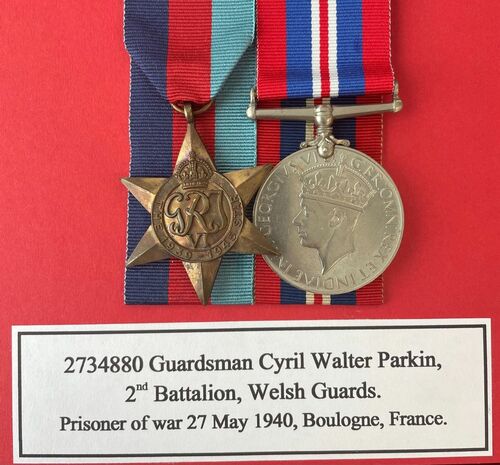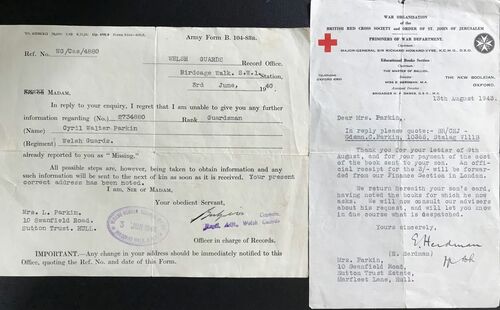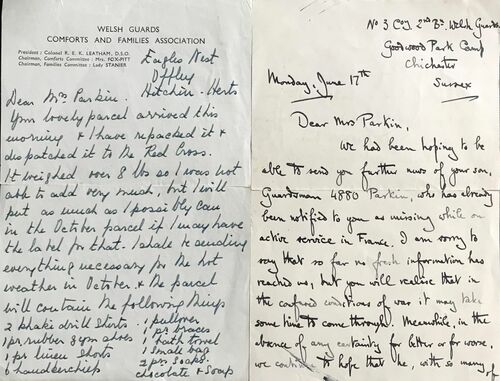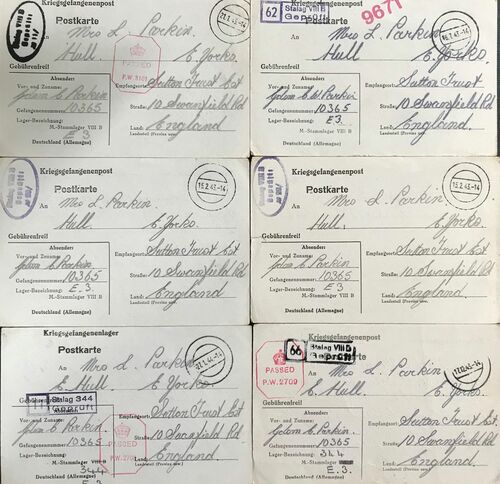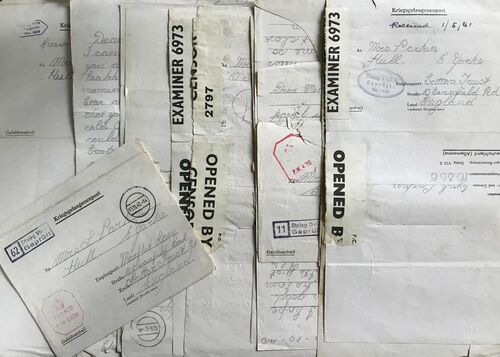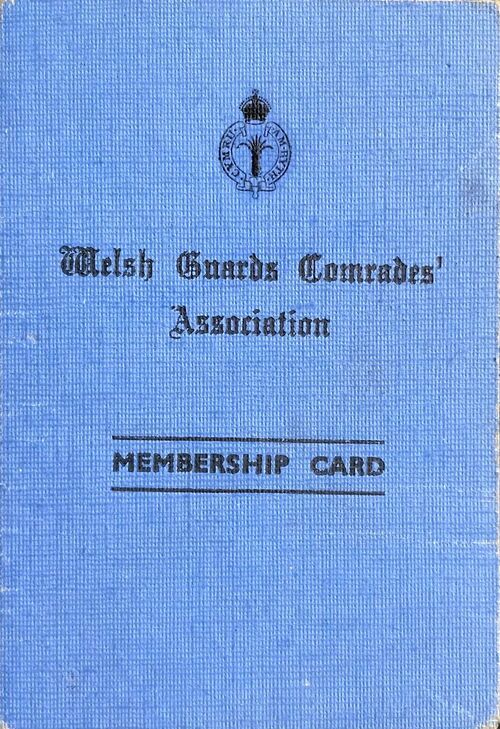Auction: 23112 - Orders, Decorations and Medals - e-Auction
Lot: 610
The well-documented campaign pair awarded to Guardsman C. W. Parkin, 2nd Battalion, Welsh Guards
The Battalion endured a last-ditch heroic defence at Boulogne before going 'in the bag'; their ordeal continued during 'The Long March' from Lamsdorf in May 1945
1939-45 Star; War Medal 1939-45, very fine (2)
Cyril Walter Parkin was born at Hull on 29 May 1915 and was a labourer upon his enlistment in the Welsh Guards on 15 July 1939. He was posted to No 3 Company, 2nd Battalion and spent most of May 1940 stationed at the Tower of London on defensive duties.
Arriving in France the Battalion was immediately in the thick of things fighting predominantly in a defensive capacity before Parkin was captured by the Germans on 27 May 1940.
The report of operations from 21 to 25 May by Major J. C. Windsor Lewis of 3 Company, 2nd Battalion Welsh Guards when the Company formed the apex of the defensive line, East of Boulogne, on the slopes of Mont Lambert takes up the story;
'I never received the Bn order to withdraw as I could not be found. I remained with my Forward Sections all the night as I was the only officer left in the Company after the battle in the morning. The others were all casualties. This explains why I never received the order to withdraw. I was therefore left in Boulogne with the two Sections that I had been with on the Road blocks; the remainder of my Coy were successfully evacuated to England with the Bn.
On hearing the news after Stand-to in the morning 24 May that the Bn had gone, I decided to move as quickly as possible to the Quayside with the men I had left.
On arrival at Quayside with the remnants of my Coy, I found the utmost confusion in progress. There were stragglers from Nos. 2 and 4 Coys, 2 W.G., some IRISH GUARDS, about 150 refugees, 120 odd French soldiers with two officers, 200 of the A.M.Ps, 120 men of R.E. and others. I collected this force in the sheds by the station while I, with a Major E.G.M. BURT of the R.E. who had since died, went off to find the minesweeper which had just come into the harbour and ask if it would evacuate us to England.
The minesweeper, which was French, refused but said that when it put to sea again that morning it would make signals to any boat or warship that is saw to come to our rescue. I had previously been told by Staff Officers on the Harbour Station that the BDE had embarked overnight for U.K. but that boats were supposed to be returning for us. They never came, and I heard later that they had been sunk in the effort to reach beleaguered Boulogne.
On re-crossing the bridge with Major BURT to get back to the troops in the sheds, we were heavily fired upon by M.G.s from neighbouring houses but using cars, etc for cover we managed to reach the sheds without being hit.
The sheds were now very congested with troops and refugees, so I sent off and officer of the R.E., Lieut. Kenneth Roscoe, to make a reconnaissance of the station itself and see how best we could defend it and obtain cover there for all. This officer returned shortly after with a comprehensive report and I decided immediately to move the refugees into the Shelters underneath the Station itself.
The Germans then began to open fire upon us in the sheds and several men were wounded. I immediately began to retire my force into the station. This was quite easily affected as there was a covered way of approach afforded by a line of railway trucks. The fire from the German tanks was quite severe when we finally abandoned the sheds which shortly afterwards went up in flames. The Germans then began to fire incendiary bombs into the Station and several of these lit up trucks which contained ammunition and inflammable matter. I hastily prepared the Station for defence by the erection of a sandbagged breastwork in front of the Station and on the left flank overlooking the Town and Custom House. The sandbags were already in the Station. Many of my Command, such as the A.M.Ps were unarmed, and while they prepared the position and carried sandbags the W. GDS personnel and French took up positions under cover and in trains, two of which were in the Station. All Ranks worked very hard and carried out their tasks under fire from enemy tanks and M.Gs.
By midday 24 May we had established as good a defensive position as possible under the circumstances. The position was held by the W. GDS and French infantry. All these troops were already thoroughly exhausted and their tenacity and bravery in keeping the enemy at bay for nearly 2 days without sufficient food and water is, I think, worthy of the highest praise.
Firing form the German tanks, of whom 3 were in front of our position, continued all day, sometimes intense at other times mild, and after 2200hrs dying down altogether. In the evening of 24 May, about 1800hrs, the Germans made an effort to landform a boat on my right flank. Their party of infantry was a small one and we drove them back to the other side of the Harbour with Bren A.T. Rifle and Rifle fire, inflicting losses upon them.
I was able to give the troops holding our positions some rest that night in relays, but early in the morning after Stand-to when the French infantry were holding our front line, the Germans again attacked heavily and we lost several men. At about 0900hrs I was able to see with binoculars big troop movements taking place on the high ground above BOULOGNE. I hoped these might be French, but it soon turned out to be a big enemy force arriving to consolidate the capture of the town.
Their artillery which had begun to fire upon us the previous evening was increased, a bit shed to the right of my position was blown up and my own wounded men were being knocked about. I made a reconnaissance to my flank to see if there was any possible way of escape, but the route was covered by two enemy tanks.
At noon the enemy, now strongly reinforced, opened up an intense fire upon my position and I was compelled to withdraw from my front line of breastworks into the Station itself, protected only by glass overhead and by a train on the left flank. There was a little food and ammunition left and no more water, and after another hour of the greatest discomfort I decided that my position was now quite hopeless and that a massacre would ensue if I did not capitulate. Having an eye to the number of refugees under my care and the big percentage of unarmed men, I decided to surrender.
My little force had fought most splendidly in the face of heavy odds. Exhausted and without proper nourishment they never lost heart.'
Parkin was incarcerated at Stalag 344 near the village of Lamsdorf which was to have sinister connotations in a few short years. On 7 January 1945 Parkin and his fellow captives, who had been held in cramped conditions with very little to eat for nearly five years were issued with orders to evacuate the camps and to forcibly march hundreds of miles west into central German territory.
Tens of thousands of men were involved in these events, thousands of whom perished. Most marched many hundreds of miles, sometimes 20 miles a day, before being liberated by allied forces in April and May of 1945. Many of the dead succumbed to starvation, exposure, and disease. Some were shot by guards for attempting escape or simply being unable to continue.
Much has been written and documented about this horrific march. Parkin survived and arrived in Germany on 10 April 1945 where he was incarcerated at Stalag 7A until 29 April 1945 when he was eventually liberated.
A page on the website http://dunkirk1940.org/index.php?&p=1_266 is dedicated to Parkin.
Sold together with a quantity of original postcards and letters sent by Parkin to his mother throughout his years of captivity and document the ordeal suffered by him and his fellow captives and the original letter from the Welsh Guards Record Office informing his mother that he was 'missing', besides letters from the Welsh Guards Comforts and Families Association and the British Red Cross, besides a quantity of research, including his MI9 report.
Subject to 20% VAT on Buyer’s Premium. For more information please view Terms and Conditions for Buyers.
Sold for
£160
Starting price
£70

